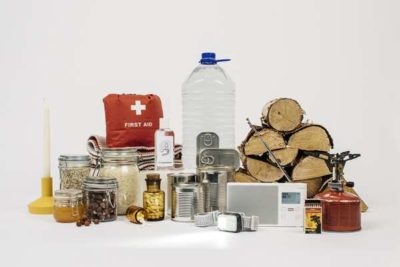Norway’s state directorate in charge of security and preparedness (DSB) has launched a campaign urging Norwegians to be prepared for a crisis. Last summer’s drought and some recent major storms have set off warnings that Norwegians should be able to cope without electricity, water and communications for at least 72 hours.

“We live in a safe and stable society where we are used to most things performing as they should,” DSB intones in its new preparedness campaign. It’s kicking off this fall with lists of items all Norwegians should have in their homes in the event of an emergency, along with lots of promotion of individual responsibility.
There’s a fear, it seems, that Norwegians are too likely to rely on public services to provide help when needed. “Folks have sky-high expectations of their public servants, and that’s good,” Justice Minister Tor Mikkel Wara told state broadcaster NRK this week. “But the world has changed, and perhaps not for the better.” More extreme weather, terror threats and the possibility of technical sabotage are among the reasons Wara, who’s also Norway’s top politician in charge of preparedness, wants Norwegians to be prepared for calamity.
“When society is hit by a major crisis, help will first have to go to those who need it most,” states Cecilie Daae, director of DSB (Direktoratet for samfunnssikkerhet og beredskap). “The more of us who are able to take care of ourselves and help those around us, the better off we are as a society. Together we can be prepared.”
Everyone is being asked to consider how they could get along with water or electricity for at least three days. Many Norwegians accustomed to life in fairly rustic holiday cabins known as hytter are already experienced with hauling water and lighting fires to keep warm. Many also have lots of camping equipment that can come in handy. Not all urban dwellings have fireplaces, though, and rely on electricity. An alternative source of warmth is especially important.
Recent floods, landslides and other natural catastrophes have left several communities around Norway isolated, or forced evacuations. DSB also urges households to be ready to run if necessary, even by having backpacks filled with the essentials if homes need to be left in a hurry.
DSB’s campaign was coinciding this week with another major event in Norway aimed at preparedness, the huge NATO military exercises involving 50,000 soldiers from all NATO countries. Daae said she doesn’t want to scare Norwegians into thinking that any crisis or military conflict looms, rather that catastrophes both natural and man-made simply can occur.
From November 1 Norwegians will also be able to buy iodine tablets without a prescription at local pharmacies. State authorities are also urging households to have them on hand, for use in the case of any nuclear accident or attack. The so-called “atomic tablets” are meant to help protect people exposed to radiation from later developing cancer. Young women and families with young children are being especially urged to have the iodine tablets (called Kaliumjodid Recip, 65mg) in stock.
newsinenglish.no/Nina Berglund

